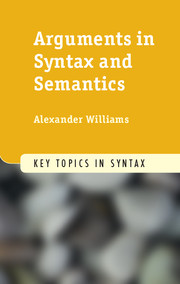2 - Semantics
Published online by Cambridge University Press: 05 January 2015
Summary
INTRODUCTION
A theory of argument structure tells us, among other things, how dependents relate to a predicate semantically. So our goal in this chapter is a preliminary understanding of semantics, in those aspects which matter to our topic. I first discuss various notions of meaning (Sections 2.2 and 2.3), structure (Section 2.4), entailment (Section 2.5) and indeterminacy (Section 2.6). I then introduce specifics: the notation I use for stating meanings (Section 2.7), the common rules of semantic combination (Section 2.8), and the basics of event semantics (Section 2.9).
VALUES
The meaning of an expression token, under one use of the term, is something outside of language to which the expression is related. Call a meaning of this sort a semantic value, or just a value. Two broad views of semantic values are most familiar in linguistics, each in important variants.
On the first view, semantic values are in general outside the mind. They include things such as Barack Obama, the event of his election, the property of having won, the actual world and possible alternatives, the truth values True and False, or various sets and pairings of these things. For example, we might say that the value of Obama is Obama; the value of won is a set of ordered pairs that pair a person with a truth value; and the value of Obama won is a truth value. Thus for some expressions, such as Obama, the semantic value may be (or include) the very thing we use the expression to talk about. Call this view objectivist.
The other view is mentalist. It sees all values as concepts or thoughts in the mind, such as the mental concept of being Obama, the mental concept of having won, the mental concept of being actual or possible, or the thought that Obama won the election.
- Type
- Chapter
- Information
- Arguments in Syntax and Semantics , pp. 23 - 44Publisher: Cambridge University PressPrint publication year: 2015

